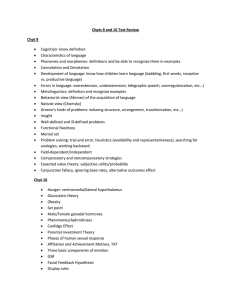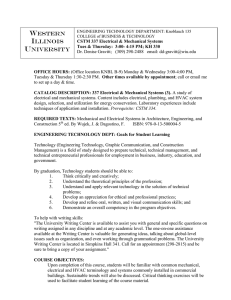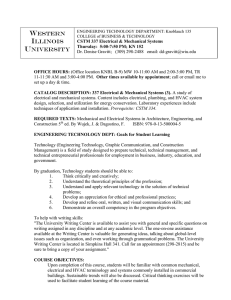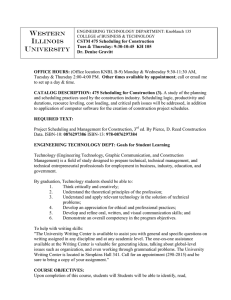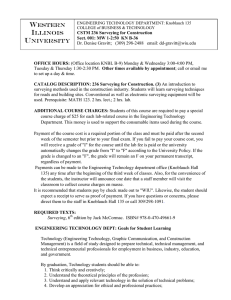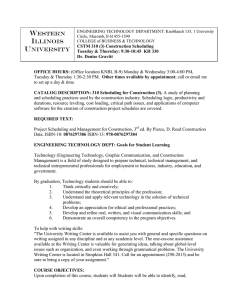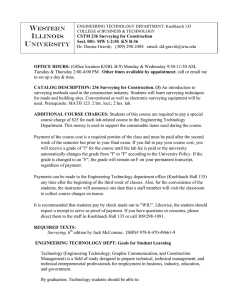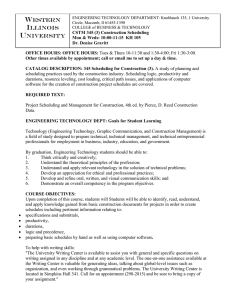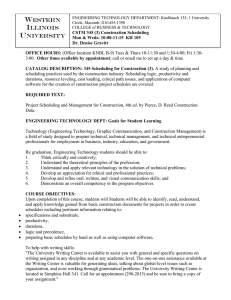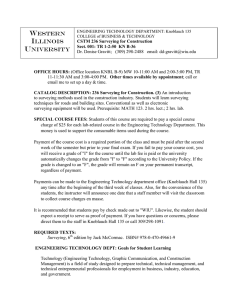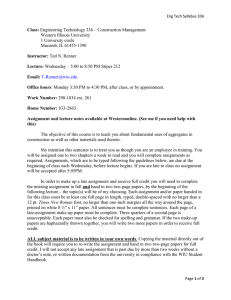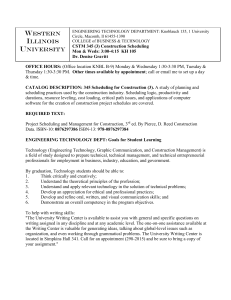W I U
advertisement
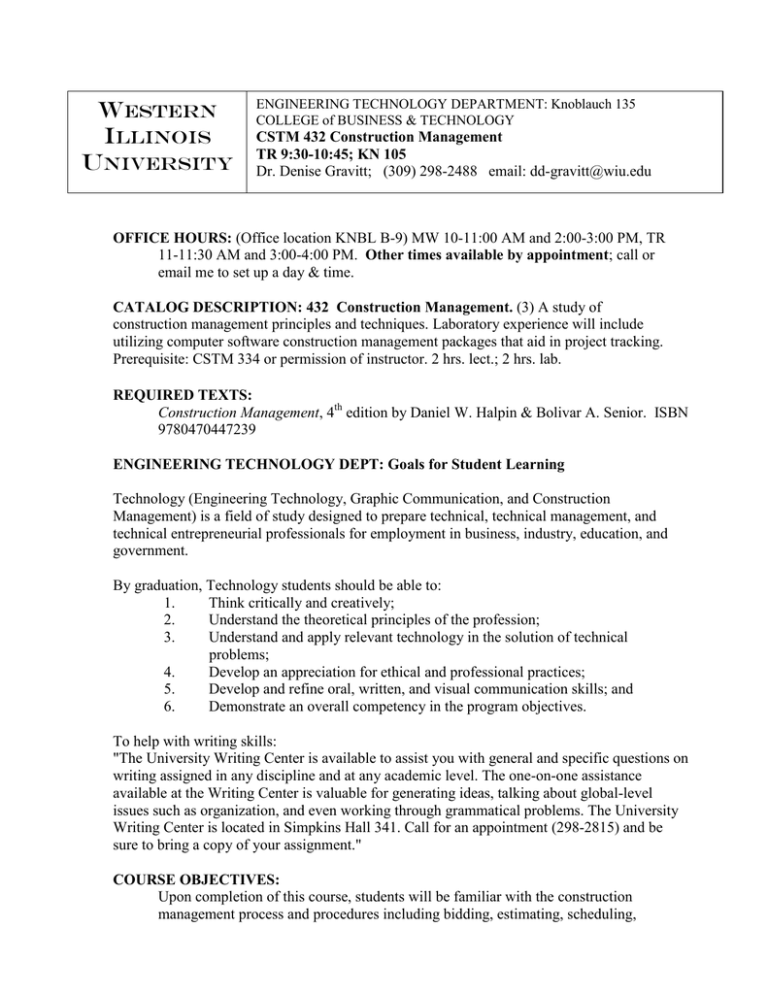
Students may tape class sessionsTECHNOLOGY if they get priorDEPARTMENT: permission of the instructor. ENGINEERING Knoblauch 135 WESTERN Illinois University COLLEGE of BUSINESS & TECHNOLOGY CSTM 432 Construction Management TR 9:30-10:45; KN 105 Dr. Denise Gravitt; (309) 298-2488 email: dd-gravitt@wiu.edu OFFICE HOURS: (Office location KNBL B-9) MW 10-11:00 AM and 2:00-3:00 PM, TR 11-11:30 AM and 3:00-4:00 PM. Other times available by appointment; call or email me to set up a day & time. CATALOG DESCRIPTION: 432 Construction Management. (3) A study of construction management principles and techniques. Laboratory experience will include utilizing computer software construction management packages that aid in project tracking. Prerequisite: CSTM 334 or permission of instructor. 2 hrs. lect.; 2 hrs. lab. REQUIRED TEXTS: Construction Management, 4th edition by Daniel W. Halpin & Bolivar A. Senior. ISBN 9780470447239 ENGINEERING TECHNOLOGY DEPT: Goals for Student Learning Technology (Engineering Technology, Graphic Communication, and Construction Management) is a field of study designed to prepare technical, technical management, and technical entrepreneurial professionals for employment in business, industry, education, and government. By graduation, Technology students should be able to: 1. Think critically and creatively; 2. Understand the theoretical principles of the profession; 3. Understand and apply relevant technology in the solution of technical problems; 4. Develop an appreciation for ethical and professional practices; 5. Develop and refine oral, written, and visual communication skills; and 6. Demonstrate an overall competency in the program objectives. To help with writing skills: "The University Writing Center is available to assist you with general and specific questions on writing assigned in any discipline and at any academic level. The one-on-one assistance available at the Writing Center is valuable for generating ideas, talking about global-level issues such as organization, and even working through grammatical problems. The University Writing Center is located in Simpkins Hall 341. Call for an appointment (298-2815) and be sure to bring a copy of your assignment." COURSE OBJECTIVES: Upon completion of this course, students will be familiar with the construction management process and procedures including bidding, estimating, scheduling, construction contractual document language and terms. Critical thinking exercises will be used to facilitate student learning of the course material. COURSE TOPICS: Construction Management, Contracts, Bidding, Scheduling, Safety & Quality Management, Construction Operations Additional readings from sources other than the text book may be assigned. Reading Lists and resources will be handed out separately. COURSE REQUIREMENTS: Each student is expected to read all assignments and write a summary entry on the topics read. Two copies of the assigned homework should be printed- one to turn in the at the BEGINNING of the class, one for the student to keep and update as the class progresses. Grades will be assigned based upon completeness of work, grammar, spelling etc. Each student is expected to attend class lectures, sessions with speakers, and exams when scheduled. FINAL EXAMINATION: Dec 13, 6-7:50 PM. See Course Calendar. Open book, notes etc. The student will complete all assigned individual activities and turn them in on the due date. Late work and emailed work will not be accepted for grading unless the student has a WIU approved absence. No work emailed to instructor will be graded. All work must be turned in on paper for grading. It is the instructor’s responsibility to provide an atmosphere conducive to learning. This means that I will not allow cell phones or iPODs (any MP3 players) to be used during class- if I see them or hear them they will be mine for the duration of the class. Nor will I allow eating or reading of papers, or side discussions with other students. Late students may not be admitted to the classroom. I expect everyone to act professionally. Thus, I will also not allow swearing or profanity, rude or disparaging jokes or behavior in class. You will get one warning, and after that if you do not correct your speech or behavior you will be asked to leave the classroom. GRADING: 2 Exams Final Exam* Optional Project Hmwk Attendance/Participation 40 % 30 % 20 % 10 % 100% * Final exam counts as one of the best 2 of 3 exams used to calculate student course grade. Final grade scale is below. No rounding up of percentages will occur. GRADES BREAKDOWN: *A+ A (97.0% - 100%) (93.0% - 96.9%) C+ C (77.0% - 79.9%) (73.0% - 76.9%) AB+ B B- (90.0% - 92.9%) (87.0% - 89.9%) (83.0% - 86.9%) (80.0% - 82.9%) CD+ D D- (70.0% - 72.9%) (67.0% - 69.9%) (63.0% - 66.9%) (60.0%- 62.9%) NOTE: WIU does not count A+. Any grade above 93% will be reported as an A. A temporary symbol of I (Incomplete) for a course may be given only when a student, due to circumstances beyond his or her control, has been unable to complete the course requirements within the official limits of the term. The circumstances must be documented to the instructor’s satisfaction. ACADEMIC INTEGRITY: Preamble Western Illinois University, like all communities, functions best when its members treat one another with honesty, fairness, respect, and trust. Students have rights and responsibilities (http://www.wiu.edu/provost/students/) and students should realize that deception for individual gain is an offense against the members of the entire community, and it is the student's responsibility to be informed and to abide by all University regulations and policies on Academic Integrity. Plagiarism, cheating, and other forms of academic dishonesty constitute a serious violation of University conduct regulations. Students who engage in dishonesty in any form shall be charged with academic dishonesty. It is a duty of faculty members to take measures to preserve and transmit the values of the academic community in the learning environment that they create for their students and in their own academic pursuits. To this end, they are expected to instill in their students a respect for integrity and a desire to behave honestly. They are also expected to take measures to discourage student academic dishonesty, to adjust grades appropriately if academic dishonesty is encountered, and, when warranted, to recommend that additional administrative sanctions be considered. Grading policies are the exclusive prerogative of the faculty; administrative sanctions are under the authority of the Director of Student Judicial Programs. This document provides policies and procedures to be followed when academic dishonesty is encountered. Definitions of Academic Dishonesty The following definitions and examples are not meant to be exhaustive. The University reserves the right to determine, in a given instance, what action constitutes a violation of academic integrity. (See www.wiu.edu/policies/acintegrity.php for complete descriptions of the following topics: 1. 2. Plagiarism Fabrication and Falsification 3. 4. 5. 6. Cheating Complicity in Academic Dishonesty Abuse of Academic Materials Multiple Submissions Reporting Academic Dishonesty All members of the University community share the responsibility and authority to challenge and make known acts of apparent academic dishonesty. Any student, faculty member, or staff person who has witnessed an apparent act of student academic dishonesty, or has information that reasonably leads to the conclusion that such an act has occurred or has been attempted, has an ethical responsibility for reporting said act(s). Confronting and reporting academic dishonesty can be done in a variety of ways, and people should choose the manner most appropriate for the circumstances. Acts of apparent academic dishonesty that occur in the classroom should be reported directly to the course instructor, and/or the course instructor's Department Chair, and/or the instructor's College Dean. The Council on Admission, Graduation, and Academic Standards (CAGAS) or the Graduate Council will not accept or act upon anonymous reports, but will hold in strict confidence the identity of any person reporting a suspected instance of academic dishonesty, unless that person consents to having his/her identity revealed. STUDENT ACCESS, DISABILITY SERVICES & Disputes: “In accordance with University policy and the Americans with Disabilities Act (ADA), academic accommodations may be made for any student who notifies the instructor of the need for an accommodation. For the instructor to provide the proper accommodation(s) you must obtain documentation of the need for an accommodation through Disability Resource Center (DRC) and provide it to the instructor. It is imperative that you take the initiative to bring such needs to the instructor's attention, as he/she is not legally permitted to inquire about such particular needs of students. Students who may require special assistance in emergency evacuations (i.e. fire, tornado, etc.) should contact the instructor as to the most appropriate procedures to follow in such an emergency. Contact Disability Resource Center (DRC) at 298-2512 for additional services.” If you have emergency medical information to share with me, if you need special arrangements in case the building must be evacuated, or if you need accommodations in this course because of a disability, please make an appointment with me as soon as possible. My office location and hours are at the top of this syllabus. If you plan to request disability accommodations, you are expected to register with the Disability Resource Center (DRC) at 298-2512. COURSE CALENDAR/ BREAKDOWN OF ASSIGNMENTS: Note: This syllabus may be revised by the instructor at any time due to progress or other issues. Please take note of revisions as discussed in class. Homework is DUE on date following the date when assigned at the BEGINNING of class. If you are late your assignment will not be accepted unless for “excused” reasons. For example, Chpt 1 problems are assigned on 8/23 and due on 8/28. The “Project” will consist of multiple activities related to one construction project with plans and specifications. Students will (in groups) be responsible for an estimate/bid, rough schedule, bid package scopes, RFI’s, Submittals, a Change Order, and a PPT Presentation of the estimate and rough schedule for the “Project”. Project work will comprise the last third of the semester. Date Topics covered 8/21 Introduction 8/23 Construction history Homework Assignments (may be revised) Get book & read Chpt 1 Read 19, Hmwk Probs:1.1, 3, 4 8/28 Chpt 19 Safety 8/30 Chpts 4 Contracts, law Hmwk: 19.1-3, (7), 8; Safety Plan; Read chpt 4 Hmwk: 4.2, 3, 5, 7, 9, 15 9/4 Chpt 5 Legal 9/6 Chpt 16 Estimating Hmwk: 5.3, 4, 9, 13; Read Chpt 16 Hmwk: 16.1, 2, 4, 6; Read Chpt 7, 9/11 Chpt 7 Project Planning Hmwk: 7.3 & 7.4; Read Chpt. 8 9/13 Chpts 8 Scheduling Hmwk: 8.2, 3, 6, 8; Read Chpt. 9 9/18 Chpt 9 Scheduling 9/20 Exam #1 Review Exam #1 9/25 Lab time- Scheduling exercise 9/27 Lab time- Scheduling exercise Read Chpts 2 & 3 10/2 Chpts 2 & 3- Bids packs/Constr Phase Hmwk: Probs:2.3-5, 8, 10, 11, 16, 18; 3.1, 3, 7-9, 12; Read Chpts 15, 17, 11 10/4 Chpts 15, 17, 11-Labor, Cost Cntrl, Cash Flow Probs:15.3, 6; 17.1-3, 5, 7, 10; 11.5 10/9 Lab time- Estimating Spreadsheets (Excel) (web site for examples: http://www.constructionworkzone.com/estimating/?source=bni079) 10/11 Lab Time Hmwk: Read Chpts 18, 13, 14 10/16 Chpts 18, 13, 14- Equipmnt, Mtrls Mgmt 10/18 Chpts 13, 14 cont’d Hmwk: Probs:18.1-3, 7 Hmwk: 13.1, 3; 14.5; Read Chpts10, 12 10/23 Chpts 10 & 12 Money/Cash Flow 10/25 Chpt 20 Operations , Review for Exam 2 10/28 Last day to drop a class Hmwk Probs: 10.13, 15; Read Chpt 20 10/30 Exam #2 11/1 Lab time Project 11/6 11/8 Lab Time Lab Time 11/13 & 11/15 Project Lab time – No Class 11/20 & 22 Thanksgiving Break 11/27 Project Documents 11/29 Project Schedule, Change order, Submittals, RFi’s, Bid scopes 12/4 Projects Due. Presentations Begin 12/6 All remaining Project Presentations; Review for Final 12/13 Final Exam 8- 9:50 AM LATE HOMEWORK POLICY: Late, or un-excused absence homework will NOT be graded or accepted for any credit. Excused absence homework will NOT be accepted more than 1 week past the assigned due date assigned based upon the student situation. ATTENDANCE, STUDENT BEHAVIOR & LATE HOMEWORK POLICIES: Attendance is required- see Student Handbook for student expectations. There will be no leaving/reentering the classroom for drinks, bathroom breaks, answering phones etc. Do your personal business before or after class. There will be no tolerance for disruptive, rude, intolerant, or discriminatory behaviors including expressions of vulgarity as determined by the instructor. Students exhibiting these behaviors including texting, answering phones, reading papers, talking to others out of turn, being argumentative, etc. will be asked to leave the classroom. More than one request to leave the classroom will result in that student not being allowed to return to the classroom for the remainder of the semester except for exams. Late or un-excused absence homework will not be graded and only homework turned in on paper will be graded. Homework is due at the beginning of the class period; no excuses for delayed printers etc. will be accepted. It is the student’s responsibility to have all work typed and printed out and turned in to be graded- plan ahead and use time management skills. Emailed versions will not be graded- only noted for date of completion. Those with documented University approved absences need to get with the instructor for missed work. Students are responsible for checking email and paying attention in class. If it is spoken, or written on board, or in syllabus, or via email it is the students responsibility to make note of the information. Notes of any presentation materials will not be given out to students- it is the student’s responsibility to take notes. DISPUTE RESOLUTION: Should a problem occur, students should speak to their instructor first. If the problem is not resolved, meet with the chair of the department. If the problem continues to be unresolved, go to the College of Business and Technology’s Dean. Students should observe the following sequence for the resolution of problems: Student --- Instructor --- Chairperson --- Dean The University Writing Center is available to assist you with general and specific questions on writing assigned in any discipline and at any academic level. The one-onone assistance available at the Writing Center is valuable for generating ideas, talking about global-level issues such as organization, and even working through grammatical problems. The University Writing Center is located in Simpkins Hall 341. Call for an appointment (298-2815) and be sure to bring a copy of your assignment. For further information about the Writing Center, please see newly revised website at www.wiu.edu/cas/english_and_journalism/university_writing_center/faqs.php.
